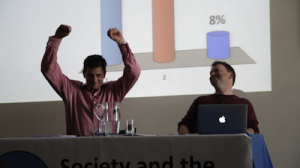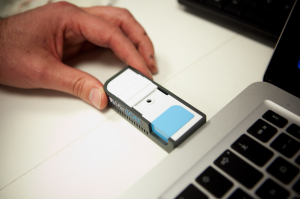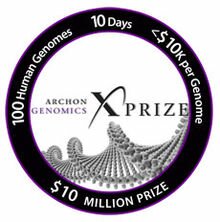 Those of us involved in genomics research spend a lot of time thinking about how scientific and technological developments might influence personal genomics. For instance, does the falling cost of sequencing mean that medically useful personal genomics will likely be based on sequence rather than genotype data? (Yes.)
Those of us involved in genomics research spend a lot of time thinking about how scientific and technological developments might influence personal genomics. For instance, does the falling cost of sequencing mean that medically useful personal genomics will likely be based on sequence rather than genotype data? (Yes.)
At the Sanger Institute we’ve recently launched (along with our friends at EBI) a project to look more deeply at a question which is less often on the lips of genomics boffins: “How does genomics affect as us people, both individually and in communities?” Because of the obvious resonance with Genomes Unzipped it should come as no surprise that many of us (including myself, Daniel and Luke) have been intimately involved in this initiative.
The actual line-up of events has been diverse, and a lot of fun. We’ve had two excellent debates, including one between Ewan Birney and Paul Flicek (pictured) on the value, or lack thereof, of celebrity genomes (covered in more detail here). A poet, Fiona Sampson, spent some time on campus and we’ve commissioned a book of poetry from her. This one raised some eyebrows, but I have to say that talking to her has given me some brand new ways of thinking about my own work. We’re also working on a more interactive project in the hope of making personal genomics a bit more personal. Stay tuned.




 To celebrate 10 years since the back-to-back publications of complete human genomes in Science and Nature, Science has published series of articles looking back at the last 10 years of genomics, and forward to the future. The article contains short essays from Francis Collins and Craig Venter, the former talking about some of the successes of medical sequencing (including giving a name and photograph to the exome-sequenced IBD patient I
To celebrate 10 years since the back-to-back publications of complete human genomes in Science and Nature, Science has published series of articles looking back at the last 10 years of genomics, and forward to the future. The article contains short essays from Francis Collins and Craig Venter, the former talking about some of the successes of medical sequencing (including giving a name and photograph to the exome-sequenced IBD patient I  Of particular interest is an article by Eliot Marshall on why genomics hasn’t yet had a large effect on medical practice, and what needs to be done to allow the genomic revolution to trickle into medical care. He argues that scientists and doctors need to meet each other half way; scientists need to focus more on showing the direct clinical utility of genomics, whereas doctors need to be more ready to accept new technologies and discoveries, and adapt the way they practice medicine to make full use of them. [LJ]
Of particular interest is an article by Eliot Marshall on why genomics hasn’t yet had a large effect on medical practice, and what needs to be done to allow the genomic revolution to trickle into medical care. He argues that scientists and doctors need to meet each other half way; scientists need to focus more on showing the direct clinical utility of genomics, whereas doctors need to be more ready to accept new technologies and discoveries, and adapt the way they practice medicine to make full use of them. [LJ] More on nanopore sequencing this week. I mentioned in my Genetic Future post that the UK sequencing company Oxford Nanopore is somewhat of a dark horse, and an agreement with Illumina has required complete silence about their potential DNA sequencing machines. However, this wasn’t strictly true; Illumina has signed an agreement for the exonuclease sequencing technology, and on that we aren’t likely to hear anything until it is ready.
More on nanopore sequencing this week. I mentioned in my Genetic Future post that the UK sequencing company Oxford Nanopore is somewhat of a dark horse, and an agreement with Illumina has required complete silence about their potential DNA sequencing machines. However, this wasn’t strictly true; Illumina has signed an agreement for the exonuclease sequencing technology, and on that we aren’t likely to hear anything until it is ready. Illumina CEO Jay Flatley announced that an upgrade to their HiSeq 2000 platform expected this spring will allow users to generate 600 gigabases of sequence (the equivalent of 5 high quality human genomes) per one-week run of the machine. This would essentially double the current throughput of the platform and propel Illumina even further ahead in the arms race of delivering vast quantities of low cost sequence data. [JCB]
Illumina CEO Jay Flatley announced that an upgrade to their HiSeq 2000 platform expected this spring will allow users to generate 600 gigabases of sequence (the equivalent of 5 high quality human genomes) per one-week run of the machine. This would essentially double the current throughput of the platform and propel Illumina even further ahead in the arms race of delivering vast quantities of low cost sequence data. [JCB] RSS
RSS Twitter
Twitter
Recent Comments